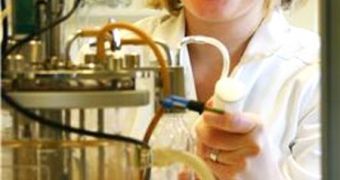At this point, hydrogen is one of the most important chemicals in the world. It helps produce a wide variety of compounds for the chemical industry. Unfortunately, this is one of the few areas of science where the gas seems to excel, in spite of scientists' best efforts of turning it into a next-generation fuel. A few ears ago, experts devised a method of producing the gas in a way that is carbon-neutral, by using bacteria, but the conversion rates were fairly low. Now, with the discovery of a new species of microorganisms, the rates have more than doubled, AlphaGalileo reports.
In the previous approach, experts identified a series of bacteria that were able to transform forest and household waste into hydrogen gas. However, the conversion only affected a small part of the chemicals in the wastes, which means that the entire process had a low efficiency. During the new investigation, scientists were able to establish a range of useful information about the recently-found bacteria species, including conditions such as how, when and why conversion hits maximum levels.
“There are three important explanations for why this bacterium, which is called Caldicellulosiruptor saccharolyticus, produces more hydrogen gas than others. One is that it has adapted to a low-energy environment, which has caused it to develop effective transport systems for carbohydrates and the ability to break down inaccessible parts of plants with the help of enzymes. This in turn means it produces more hydrogen gas. The second explanation is that it can cope with higher growth temperatures than many other bacteria. The higher the temperature, the more hydrogen gas can be formed,” says Karin Willquist.
The expert is a PhD student in applied microbiology at the Lund University and is scheduled to present the conclusions of the investigation in more detail in her thesis. The scientist says that the new bacteria are also capable of producing the gas in high partial hydrogen pressure, which means that the entire production process could finally become financially-sustainable. She adds hydrogen gas is still not a very environmentally friendly energy carrier, precisely because existing methods of producing the gas are very energy-intensive. Replacing them with the use of bacteria could make hydrogen gain a wider acceptance in industries.

 14 DAY TRIAL //
14 DAY TRIAL //